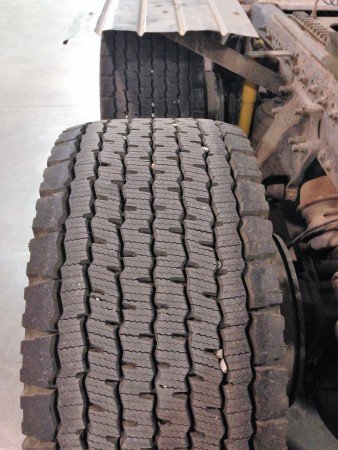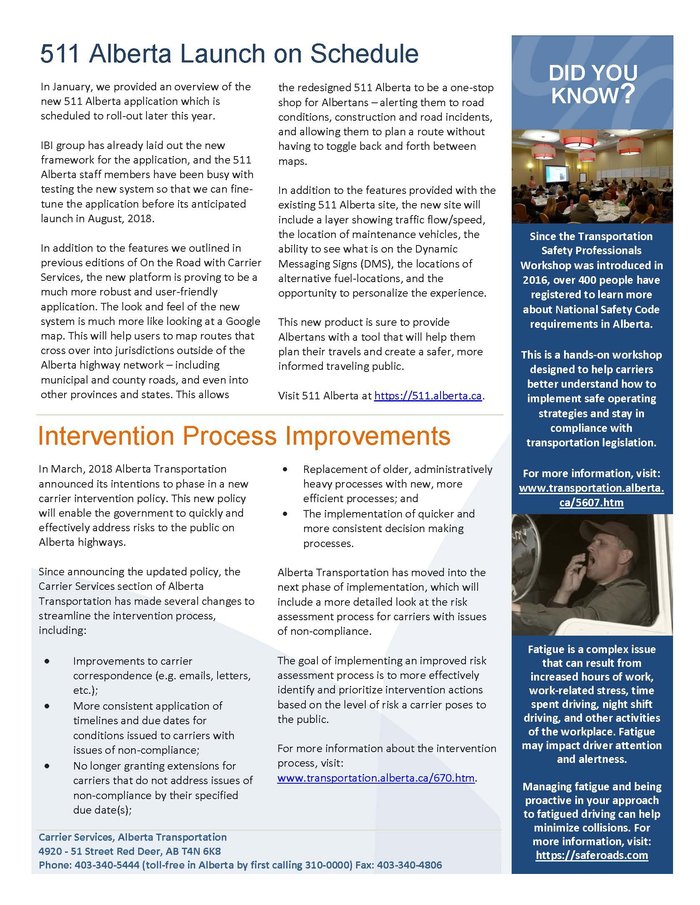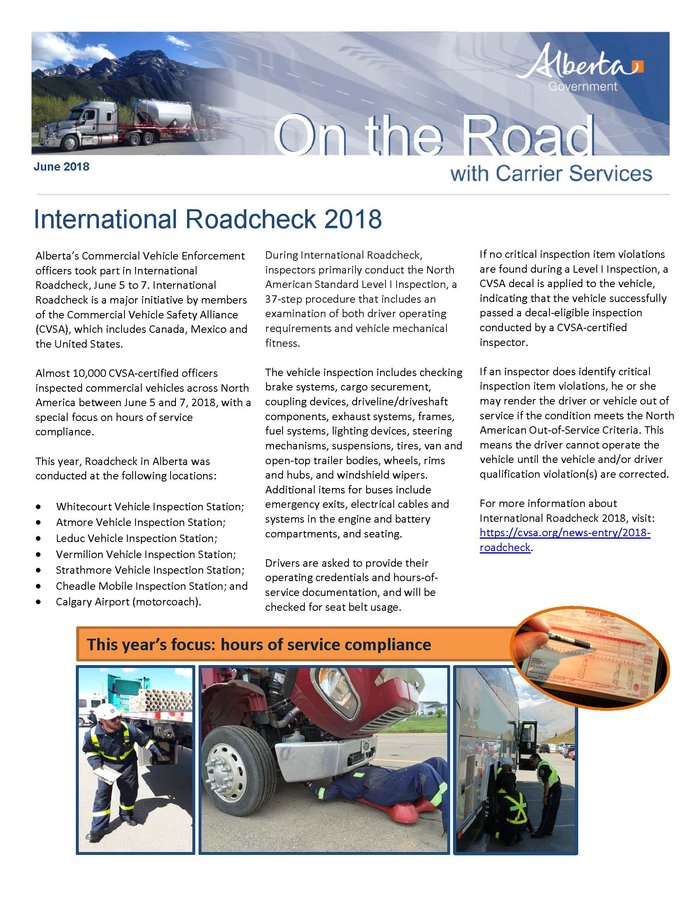Western Transportation Safety Consulting Ltd.
in Lethbridge
On June 22
at 2:40 PM
B.C. ups weight limit for super singles. VICTORIA, B.C. – The B.C. government has increased weight limits for single wide-base tires, approving a single-axle weight of 8,500kgs. The government says the increase will help the trucking industry reduce fuel consumption, as well as lower greenhouse gas emissions. Permitting the higher weight limit also equates to less trips needed to transport freight. B.C. now aligns with other provinces that have increased weight limits for new generation super singles, which the government said would eliminate any operating disadvantage for provincial carriers. The previous weight limit in B.C. was 7,700kgs. Older single wide-base tires that are 445-454 millimeters in width will remain at the 7,700kg weight limit. Read the full article by Truck News at: https://www.trucknews.com/transportation/b-c-ups-weight-limit-super-singles/1003086396/

Western Transportation Safety Consulting Ltd.
in Lethbridge
On June 14
at 1:00 PM
New carrier connected to Humboldt incident being carefully monitored by Alberta Transportation. CALGARY, Alta. – One of the drivers and trucks from the carrier involved in the Humboldt Broncos bus collision is operating under a new numbered company, according to Alberta Transportation. Though the lone driver currently employed by the numbered company is not the individual who was involved in the incident that claimed the lives of 16 people and injured 13, Alberta Transportation is keeping a close eye on the carrier. “Alberta Transportation did its due diligence by immediately suspending the numbered company’s Safety Fitness Certificate (SFC) until the company could demonstrate it was in full compliance with all commercial transportation safety legislation,” read a statement released by Alberta Transportation. “Once the carrier demonstrated that it was in compliance Alberta Transportation had no legal grounds to maintain the suspension and the suspension was lifted on June 1.” Conditions have been attached to the SFC of the numbered company, and a follow-up audit will be conducted over the next three months. Graeme McElheran, director of communications for Alberta Transportation, told Truck West it is important to understand that the suspension of Adesh Deol Trucking, the company involved in the Humboldt Broncos bus collision, applies to the carrier’s SFC, not to any individual involved with the company or its assets. “While the carrier’s SFC remains suspended,” said McElheran, “there is nothing stopping any of the people involved with the company from seeking employment elsewhere.” However, if a carrier’s SFC is downgraded to unsatisfactory, all owners, directors, and stakeholder of the company are prohibited from applying for a new SFC for a period of six months. And if the SFC is suspended, and the owners, directors, and stakeholders attempt to operate another company, Alberta Transportation will investigate their roles with the new carrier. “They might work for another carrier, but if they are found to have executive or management roles, Alberta Transportation may suspend, downgrade, or apply conditions to the carrier’s SFC,” said McElheran. The Alberta government will be monitoring the new numbered carrier’s profile on a regular basis over the next three months to see if any events are added by authorities when conducting inspections and roadside enforcement to ensure compliance. Taking all matters of road safety seriously, McElheran said Alberta Transportation is in process of reviewing driver training polices. “Alberta Transportation has been reviewing several of its policies and regulations for commercial carriers as a matter of due diligence to address concerns and enhance road safety,” he said. “These reviews include mandatory driver training, enhanced pre-entry requirements for new companies, and the safety of intersections across Alberta. “Like millions of Canadians and people around the world, we were deeply saddened by the tragedy in Saskatchewan involving the Humboldt Broncos, and we extend our condolences to the families and friends of the victims of this heartbreaking incident.” See the full article from Truck News at: https://www.trucknews.com/regulations/new-carrier-connected-humboldt-incident-carefully-monitored-alberta-transportation/1003086218/

Western Transportation Safety Consulting Ltd.
in Lethbridge
On June 12
at 2:07 PM
On the Road with Carrier Services, Pg. 2

Western Transportation Safety Consulting Ltd.
in Lethbridge
On June 12
at 2:06 PM
On the Road with Carrier Services, Pg.1

Western Transportation Safety Consulting Ltd.
in Lethbridge
On June 11
at 3:37 PM
Do your homework on IFTA/IRP recordkeeping. Think back to the days when you had to bring a report card home. For the most part, the grades were a measure of how you were learning and progressing in school. But then there were the comments. Yikes! “Sandra would do much better in class if she were to listen more and talk less.” Whatever. IRP and IFTA issue report cards, too, in the form of an “annual report of plan activity.” Every year, each jurisdiction says how many fleet accounts it has, how many fleets renewed their credentials, how many were audited, how many audits produced charges, and other details. For us fleet tax compliance nerds, it’s a great way to see what the jurisdictions are up to. The IRP report has two new categories this year: inadequate assessments and dollars assessed for inadequate assessments. We don’t have the same data available in the IFTA report. In recent years, IFTA and IRP have adopted language regarding the adequacy of records to conduct an audit. This gives auditors latitude in determining whether records are auditable even when they don’t entirely meet IFTA/IRP requirements (many jurisdictions conduct IFTA and IRP audits at the same time). For example, some fleets can give an auditor a neatly wrapped package of source documents, monthly summaries, and all the fuel receipts. Others offer a shoebox full of unsorted papers. Or a “dog ate my data” shrug. At this point, the auditor can determine whether there are sufficient records to do the job. Some auditors will work with the shoebox and some won’t, and no one is going to believe the dog story. According to the 2016 IRP annual report, 30% of carriers were determined to have inadequate records. In California, auditors determined that 418 of 559 audits involved inadequate records. That’s right, auditors determined that 75% of carriers in the state had records that were inadequate for audit—to the tune of $1,113,926.90 in dollars assessed. The problem isn’t limited to big states. Prince Edward Island conducted seven audits and assessed five as having inadequate records, or 77%. New Jersey conducted 466 audits and 356, or 76%, involved inadequate records. The penalties can add up. On a first offense in an IRP assessment, you’ll pay an additional 20% of the fees you paid when you apportioned your vehicles. For a second offense, the penalty is 50% of your apportioned fees. Third time, it’s 100%. Now multiply that amount by two or three since a typical audit period can be anywhere from one to three years. IFTA will assess based your KPL/MPG factor by either bringing it down to 1.7 KPL/4 MPG or reducing your KPL/MPG by 20%. Not only that, they can disallow any credit for tax paid at the pump. There’s a whole bunch of “it depends” surrounding an IFTA assessment, but penalties can be substantial. Remember, an audit is subjective. If you know the rules and can defend your recordkeeping choices, you’ll likely be OK. But if you haven’t done your homework or your records are a mess, you’re going to wish you hadn’t played hooky when the teacher was telling you to brush up on your IFTA/IRP reporting skills. For all of your IFTA/IRP reporting needs, contact Western Transportation Safety Consulting Ltd. at 1- 844-320-1086 or find out more at: westerntransportation.ca Read the full article by Sandy Johnson from Truck News at: https://www.trucknews.com/features/homework-iftairp-recordkeeping/

Page 1 of 20


